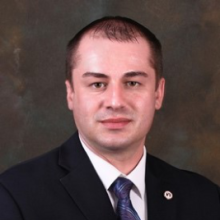Newly introduced legislation would take away local zoning and siting control for commercial wind and solar energy projects and transfer it to the state-run Michigan Public Service Commission.
Michigan Farm Bureau is opposed to the proposal and is urging members to tell state representatives and senators, “Locals know best.”
Send a prewritten or personalized message from https://bit.ly/MIFBenergy or text ‘MIENERGY’ to 52886.
Proposed amendments are formally outlined within House Bills 5120, 5121, 5122 and 5123, introduced on Oct. 10 and sponsored by Reps. Abraham Aiyash (D-Hamtramck), Philip Skaggs (D-East Grand Rapids) and Ranjeev Puri (D-Canton).
The idea of shifting wind, solar and energy storage facility zoning and siting control away from locals isn’t new: Gov. Gretchen Whitmer alluded to it in her August “What’s Next Address” and again in a September email update referencing, “Streamlining permitting of clean energy projects through the MPSC to move faster, create more jobs, and get shovels into the ground,” as one way Michigan can become a “clean energy leader.”
Read next: Whitmer pushing plan to put wind, solar projects under state control
In less than 24 hours after the bills were released, the House Energy, Communications and Technology Committee took up the bills, hearing testimony from the bill sponsors and stakeholders. Michigan Farm Bureau Legislative Counsel Andrew Vermeesch submitted written testimony in opposition of the bills.
“While Michigan Farm Bureau recognizes the critical role renewable energy plays in our state’s transition to a sustainable energy future, we cannot overlook the profound impact this will have on rural areas, particularly our farmland,” Vermeesch wrote. “Unfortunately, the bills currently under consideration by the committee threatens to strip away this essential (local) authority, putting the long-term planning and wellbeing of many agricultural communities across the state in jeopardy.”
Vermeesch says it’s critical county Farm Bureau members act quickly to tell representatives and senators to oppose the bill and keep commercial solar and wind energy decisions safely in the hands of local communities.
“Our window of time to demonstrate opposition and prevent this proposal from becoming a reality is likely narrow,” he added.
MFB Government Relations Specialist Matt Kapp said the organization’s member-developed policy on this issue is clear in that, “We oppose any actions that would eliminate local control on siting for commercial renewable energy projects.”
“The bottom line is locals know best,” he said.
“We encourage members and county Farm Bureaus to work with local governments to establish zoning for renewable energy because local township officials are best positioned to evaluate suitable locations for projects and consider other variables in ways that state level authorities cannot,” Kapp added.
“A one-size-fits-all approach will not serve Michigan’s diverse communities well.”
MFB’s position is rooted in MFB Policy #81 Land Use, supporting farmers and county Farm Bureaus working with local governments to establish zoning standards and MFB Policy #66 Local Government, outlining support for Michigan’s township government system.
Joining MFB in its opposition to the legislation are the Michigan Townships Association, the Michigan Association of Planning, and the Southeast Michigan Council of Governments.
Share Story
Article Tags

Matt Kapp


